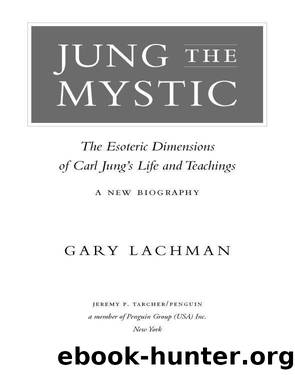Jung the Mystic by Gary Lachman

Author:Gary Lachman
Language: eng
Format: epub
Publisher: Penguin Publishing Group
Published: 2010-05-12T00:00:00+00:00
A better-known work to emerge from Jungâs crisis was Psychological Types, published in 1921, and which no doubt benefited from Jungâs observation of the members of the Psychological Club. Although the question of typology had a long history, of which Jung was at pains to inform his readers, reviewing at length the ideas of Nietzsche, Schiller, William James and othersâas in Symbols of Transformation, Jung pours on the referencesâJungâs central impetus for the work appears to have been âthirty pages of his Red Book,â at least according to an account given by the Dutch poet Roland Holst.18 By now Jungâs ideas on the introvert, extravert, and the four âfunctionsââthinking, feeling, sensation, intuitionâhave become part of common parlance: extraverts, we know, love parties; introverts stay at home. As often happens when specialized terminology becomes part of everyday speech, in the process they have lost much of their meaning, or have acquired so wide a use that whatever meaning they had originally has become clichéd. âPersonality Testsâ to determine your âtypeâ using Jungâs terminology are as common as newspaper horoscopes; probably the most popular is the Myers-Briggs Personality Test. Extravert and introvert seem anchored in Jungâs experience of his No. 1 and No. 2; one face is turned toward the outer world, the other looks inside. Thinking, feeling, sensation, and intuition are different modes of adaptation; in each of us one is dominant, with an auxiliary mode as a âsecond in command.â As the terms suggest, thinkers adapt through thought, feelers through their feelings, sensation types through the senses, and intuitives through hunches and sudden insights. Jung calls thinking and feeling rational functions, as they operate through weighing pros and cons; sensing and intuition are irrational in the sense that they donât argue or give reasons (âI think this is true because . . . I feel itâs good because . . .â) but simply are: one doesnât decide to smell a particular odor or have a hunch. But as one function becomes hypertrophied, its opposite or complement atrophies, and so to achieve balance, an individualâs âinferiorâ function needs to be strengthened.
Itâs also through the inferior function that the unconscious enters consciousness; hence itâs often the subject of active imagination. As the psyche is self-regulating, it invariably seeks to adjust itself, as a thermostat does the heating. So when a thinker (whose auxiliary function is either sensation or intuition) becomes too obsessed with thought and disregards feeling, the unconscious brings this to his attention, often to the thinkerâs dismay: irrational moods, sentimentality, and irritability are some of the unconsciousâ wake-up calls. In his thought a thinker may be as brilliant as the sun, but his feelings are generally those of a twelve-year-old. One classic example is the philosopher Bertrand Russell, who was as brilliant as they come but who never outgrew an embarrassing womanizing and was chasing skirts in his seventies.19 (Having said this, Jung comes to mind as well, and he himself recognized that feeling was his weak spot).
Itâs a neat
Download
This site does not store any files on its server. We only index and link to content provided by other sites. Please contact the content providers to delete copyright contents if any and email us, we'll remove relevant links or contents immediately.
Hit Refresh by Satya Nadella(9137)
When Breath Becomes Air by Paul Kalanithi(8447)
The Girl Without a Voice by Casey Watson(7889)
A Court of Wings and Ruin by Sarah J. Maas(7847)
Do No Harm Stories of Life, Death and Brain Surgery by Henry Marsh(6941)
Shoe Dog by Phil Knight(5269)
The Rules Do Not Apply by Ariel Levy(4969)
A Higher Loyalty: Truth, Lies, and Leadership by James Comey(4964)
Hunger by Roxane Gay(4928)
Tuesdays with Morrie by Mitch Albom(4784)
Everything Happens for a Reason by Kate Bowler(4743)
The Immortal Life of Henrietta Lacks by Rebecca Skloot(4588)
Millionaire: The Philanderer, Gambler, and Duelist Who Invented Modern Finance by Janet Gleeson(4478)
How to Change Your Mind by Michael Pollan(4357)
All Creatures Great and Small by James Herriot(4322)
The Money Culture by Michael Lewis(4207)
Man and His Symbols by Carl Gustav Jung(4137)
Elon Musk by Ashlee Vance(4128)
Tokyo Vice: An American Reporter on the Police Beat in Japan by Jake Adelstein(3996)
